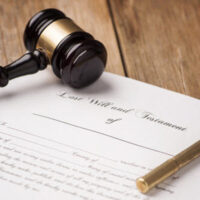Is It Possible to Probate a Copy of the Lost Will in Florida?

A Last Will and Testament (“Will”) is a legal document that outlines a person’s wishes regarding the disposition of his or her property at the time of death. When clients take possession of their original Will after signing, it is not uncommon if the testator (the creator of the Will) loses the original Will, or it gets destroyed, either inadvertently or unintentionally. It is extremely important that the testator take precautionary measures to ensure that the Will is kept safe.
Ideally, all original estate planning documents should be kept with your attorney in their firm’s safe or storage space. However, if you do keep your original documents, they should be kept in a safe, fireproof lockbox at home, or in a bank safe deposit box. Only one or two trusted people should know where the Will is safeguarded.
What Happens if the Original Will Cannot Be Located?
If the testator did not take any of the above-mentioned precautions, your loved ones may be unable to locate your Will after your death. It is often difficult to determine if the original Will was accidentally lost or intentionally destroyed. Did the testator actually create a Will? Did they intentionally destroy it? If there is a Will that is simply lost, what did its terms state?
If you know there is a Will, but you have been unable to locate the original document, you may want to discuss your options with a lawyer. A lawyer should be able to provide some guidance how to search for the original Will, and options if you cannot find it.
If the original document has been misplaced, Florida has very specific requirements for establishing the validity of a Will when only a copy is available. In order to admit a lost Will to probate, your attorney will have to file a petition to probate a copy of the Will. Section §733.207, Florida Statutes, states:
- If a copy is provided, the specific content of the Will must be proved by one disinterested witness; or
- If there is no copy available, the full and precise terms of the Will must be proved by two disinterested witnesses.
What if There is a Copy of the Lost Will?
When a copy of the Will is available, there is more evidence that the document was the desire of the Testator. At least one witness must testify that the copy submitted to the court is the accurate copy of the Will that he or she witnessed and signed in the presence of the Testator.
What if There is Not a Copy of the Lost Will?
If there is no copy of the Will available, admitting the “Will” to probate is more difficult for several reasons:
- Two witnesses are required to establish a lost Will,
- It may be difficult to identify or locate the witnesses who signed the original Will,
- The two witnesses must be able to establish the terms of the Will to the best of their knowledge.
In addition to the above issues, Florida law also presumes that the Testator revoked the Will if the original, which was last known to be in the Testator’s possession, is unable to be located at the decedent’s death. So not only do you have to prove the contents of the Will, but you will need to overcome this presumption of revocation by the Testator.
If the Will was not intentionally destroyed by the testator, the personal representative (executor) or another party seeking to establish the Will has the burden to prove that the testator did not tear it up, burn it, or in any other way destroy the document with intent to revoke it.
Probating a lost Will when there is no copy available is a difficult process. Speak with a St. Petersburg estate planning lawyer if you are trying to probate a missing Will. Contact Legacy Protection Lawyers, LLP, at 727-471-5868 to review your options.
